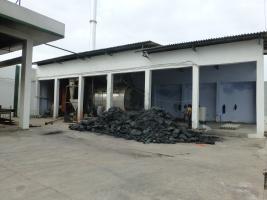You are here
Kanpur Leather development Project: Energy and carbon footprint assessment conducted in six tanneries in Kanpur by Ms. Jutta Knoedler, International Expert – Energy Management
Energy and carbon footprint assessment conducted in six tanneries in Kanpur by Ms. Jutta Knoedler, International Expert – Energy Management, UNIDO, Kanpur revealed the following results:
The energy consumption Rawhide to finished leather was in the range of 29 – 53.4 MJ/m² of finished leather (mixed production on site), while one tannery used 160 MJ/m² which has its own Zero Liquid Discharge (ZLD).
The deviation of the international Benchmark Best Energy Efficiency for Tanning for each tannery was calculated in a range of -37.2% to +4.4 %.
CO2 emission equivalent contributed from production processes in these tanneries varied from 3.03 to 6.91 kg CO2/m2 of finished leather, whereas the same including upstream and downstream operations varied from 3.61 to 8.6 kg CO2/m2
The following recommendations were provided after the assessment:
| No | Equipment / system | Energy savings | Cost saving | CO2 reduction |
|---|---|---|---|---|
| 1 | Motors (energy class, V belts, maintenance) | √ | √ | √ |
| 2 | Voltage stabilisers | √ | ||
| 3 | Contract optimization | √ | ||
| 4 | OLTC on HT transformer | √ | ||
| 5 | Automatic power factor control | √ | ||
| 6 | Optimum size of generators | √ | √ | √ |
| 7 | Electrical load optimization | √ | √ | √ |
| 8 | Change of old generators | √ | √ | √ |
| 9 | Cogeneration (combined heat and power) | √ | √ | √ |
| 10 | Tri-generation (combined cooling, heating and power) | √ | √ | √ |
| 11 | Production running time optimization | √ | √ | √ |
| 12 | Light bulbs replacement with LED, automatic sensors | √ | √ | √ |
| 13 | Fans (regulation, eco-ventilation, automatic sensors) | √ | √ | √ |
| 14 | Air condition and air cooler systems | √ | √ | √ |
| 15 | Cooling tower (fan control by temperature, replace Al fan blades), Remark: prevention of legionella danger | √ | √ | √ |
| 16 | Air-compressor (leak arrest, heat exchanger, pressure optimization) | √ | √ | √ |
| 17 | Water heater / steam boiler: economiser | √ | √ | √ |
| 18 | Water heater / steam boiler: use of thermic oil heater | √ | √ | √ |
| 19 | Heat exchanger (maintenance / fouling) | √ | √ | √ |
| 20 | Steam / hot-water tank + pipeline insulations, closed tanks | √ | √ | √ |
| 21 | Drying tunnels: heat recovery systems | √ | √ | √ |
| 22 | Drying tunnels: energy controlled systems | √ | √ | √ |
| 23 | Toggle drier: plastic curtains for in/out openings | √ | √ | √ |
| 24 | Solar photovoltaic system for electricity (during power-cut still need generator), system efficiency only 10-20% | √ | √ | |
| 25 | Photovoltaic thermal hybrid system (PVT) for electricity + hot-water or hot air supply | √ | √ | √ |
| 26 | Solar thermic oil system (direct dryer heating / thermal oil boiler) | √ | √ | |
| 27 | Solar hot water system (dryer heating / boiler supply) | √ | √ |
















